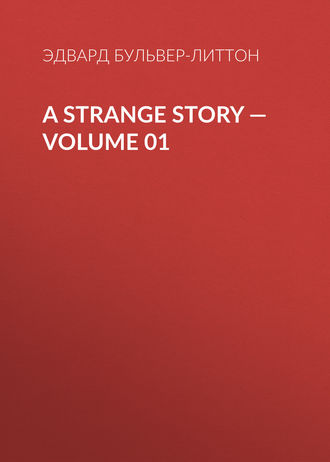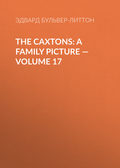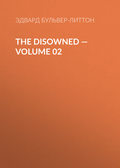
Эдвард Бульвер-Литтон
A Strange Story — Volume 01
We might have sat together five minutes, side by side in silence as complete as if in the cave of Trophonius—when without looking up from her work, Mrs. Poyntz said abruptly,—
"I am thinking about you, Dr. Fenwick. And you—are thinking about some other woman. Ungrateful man!"
"Unjust accusation! My very silence should prove how intently my thoughts were fixed on you, and on the weird web which springs under your hand in meshes that bewilder the gaze and snare the attention."
Mrs. Poyntz looked up at me for a moment—one rapid glance of the bright red hazel eye—and said,—
"Was I really in your thoughts? Answer truly."
"Truly, I answer, you were."
"That is strange! Who can it be?"
"Who can it be? What do you mean?"
"If you were thinking of me, it was in connection with some other person,—some other person of my own sex. It is certainly not poor dear Miss Brabazon. Who else can it be?"
Again the red eye shot over me, and I felt my cheek redden beneath it.
"Hush!" she said, lowering her voice; "you are in love!"
"In love!—I! Permit me to ask you why you think so?"
"The signs are unmistakable; you are altered in your manner, even in the expression of your face, since I last saw you; your manner is generally quiet and observant,—it is now restless and distracted; your expression of face is generally proud and serene,—it is now humbled and troubled. You have something on your mind! It is not anxiety for your reputation,—that is established; nor for your fortune,—that is made; it is not anxiety for a patient or you would scarcely be here. But anxiety it is,—an anxiety that is remote from your profession, that touches your heart and is new to it!"
I was startled, almost awed; but I tried to cover my confusion with a forced laugh.
"Profound observer! Subtle analyst! You have convinced me that I must be in love, though I did not suspect it before. But when I strive to conjecture the object, I am as much perplexed as yourself; and with you, I ask, who can it be?"
"Whoever it be," said Mrs. Poyntz, who had paused, while I spoke, from her knitting, and now resumed it very slowly and very carefully, as if her mind and her knitting worked in unison together,—"whoever it be, love in you would be serious; and, with or without love, marriage is a serious thing to us all. It is not every pretty girl that would suit Allen Fenwick."
"Alas! is there any pretty girl whom Allen Fenwick would suit?"
"Tut! You should be above the fretful vanity that lays traps for a compliment. Yes; the time has come in your life and your career when you would do well to marry. I give my consent to that," she added with a smile as if in jest, and a slight nod as if in earnest. The knitting here went on more decidedly, more quickly. "But I do not yet see the person. No! 'T is a pity, Allen Fenwick" (whenever Mrs. Poyntz called me by my Christian name, she always assumed her majestic motherly manner),—"a pity that, with your birth, energies, perseverance, talents, and, let me add, your advantages of manner and person,—a pity that you did not choose a career that might achieve higher fortunes and louder fame than the most brilliant success can give to a provincial physician. But in that very choice you interest me. My choice has been much thesame,—a small circle, but the first in it. Yet, had I been a man, or had my dear Colonel been a man whom it was in the power of a woman's art to raise one step higher in that metaphorical ladder which is not the ladder of the angels, why, then—what then? No matter! I am contented. I transfer my ambition to Jane. Do you not think her handsome?"
"There can be no doubt of that," said I, carelessly and naturally.
"I have settled Jane's lot in my own mind," resumed Mrs. Poyntz, striking firm into another row of knitting. "She will marry a country gentleman of large estate. He will go into parliament. She will study his advancement as I study Poyntz's comfort. If he be clever, she will help to make him a minister; if he be not clever, his wealth will make her a personage, and lift him into a personage's husband. And, now that you see I have no matrimonial designs on you, Allen Fenwick, think if it will be worth while to confide in me. Possibly I may be useful—"
"I know not how to thank you; but, as yet, I have nothing to confide."
While thus saying, I turned my eyes towards the open window beside which I sat. It was a beautiful soft night, the May moon in all her splendour. The town stretched, far and wide, below with all its numberless lights,—below, but somewhat distant; an intervening space was covered, here, by the broad quadrangle (in the midst of which stood, massive and lonely, the grand old church), and, there, by the gardens and scattered cottages or mansions that clothed the sides of the hill.
"Is not that house," I said, after a short pause, "yonder with the three gables, the one in which—in which poor Dr. Lloyd lived—Abbots' House?"
I spoke abruptly, as if to intimate my desire to change the subject of conversation. My hostess stopped her knitting, half rose, looked forth.
"Yes. But what a lovely night! How is it that the moon blends into harmony things of which the sun only marks the contrast? That stately old church tower, gray with its thousand years, those vulgar tile-roofs and chimney-pots raw in the freshness of yesterday,—now, under the moonlight, all melt into one indivisible charm!"
As my hostess thus spoke, she had left her seat, taking her work with her, and passed from the window into the balcony. It was not often that Mrs. Poyntz condescended to admit what is called "sentiment" into the range of her sharp, practical, worldly talk; but she did so at times,—always, when she did, giving me the notion of an intellect much too comprehensive not to allow that sentiment has a place in this life, but keeping it in its proper place, by that mixture of affability and indifference with which some high-born beauty allows the genius, but checks the presumption, of a charming and penniless poet. For a few minutes her eyes roved over the scene in evident enjoyment; then, as they slowly settled upon the three gables of Abbots' House, her face regained that something of hardness which belonged to its decided character; her fingers again mechanically resumed her knitting, and she said, in her clear, unsoftened, metallic chime of voice, "Can you guess why I took so much trouble to oblige Mr. Vigors and locate Mrs. Ashleigh yonder?"
"You favoured us with a full explanation of your reasons."
"Some of my reasons; not the main one. People who undertake the task of governing others, as I do, be their rule a kingdom or a hamlet, must adopt a principle of government and adhere to it. The principle that suits best with the Hill is Respect for the Proprieties. We have not much money; entre nous, we have no great rank. Our policy is, then, to set up the Proprieties as an influence which money must court and rank is afraid of. I had learned just before Mr. Vigors called on me that Lady Sarah Bellasis entertained the idea of hiring Abbots' House. London has set its face against her; a provincial town would be more charitable. An earl's daughter, with a good income and an awfully bad name, of the best manners and of the worst morals, would have made sad havoc among the Proprieties. How many of our primmest old maids would have deserted tea and Mrs. Poyntz for champagne and her ladyship! The Hill was never in so imminenta danger. Rather than Lady Sarah Bellasis should have had that house, I would have taken it myself, and stocked it with owls.
"Mrs. Ashleigh turned up just in the critical moment. Lady Sarah is foiled, the Proprieties safe, and so that question is settled."
"And it will be pleasant to have your early friend so near you."
Mrs. Poyntz lifted her eyes full upon me.
"Do you know Mrs. Ashleigh?"
"Not in the least."
"She has many virtues and few ideas. She is commonplace weak, as I am commonplace strong. But commonplace weak can be very lovable. Her husband, a man of genius and learning, gave her his whole heart,—a heart worth having; but he was not ambitious, and he despised the world."
"I think you said your daughter was very much attached to Miss Ashleigh? Does her character resemble her mother's?"
I was afraid while I spoke that I should again meet Mrs. Poyntz's searching gaze, but she did not this time look up from her work.
"No; Lilian is anything but commonplace."
"You described her as having delicate health; you implied a hope that she was not consumptive. I trust that there is no serious reason for apprehending a constitutional tendency which at her age would require the most careful watching!"
"I trust not. If she were to die—Dr. Fenwick, what is the matter?"
So terrible had been the picture which this woman's words had brought before me, that I started as if my own life had received a shock.
"I beg pardon," I said falteringly, pressing my hand to my heart; "a sudden spasm here,—it is over now. You were saying that—that—"
"I was about to say-" and here Mrs. Poyntz laid her hand lightly on mine,—"I was about to say that if Lilian Ashleigh were to die, I should mourn for her less than I might for one who valued the things of the earth more. But I believe there is no cause for the alarm my words so inconsiderately excited in you. Her mother is watchful and devoted; and if the least thing ailed Lilian, she would call in medical advice. Mr. Vigors would, I know, recommend Dr. Jones."
Closing our conference with those stinging words, Mrs. Poyntz here turned back into the drawing-room.
I remained some minutes on the balcony, disconcerted, enraged. With what consummate art had this practised diplomatist wound herself into my secret! That she had read my heart better than myself was evident from that Parthian shaft, barbed with Dr. Jones, which she had shot over her shoulder in retreat. That from the first moment in which she had decoyed me to her side, she had detected "the something" on my mind, was perhaps but the ordinary quickness of female penetration. But it was with no ordinary craft that the whole conversation afterwards had been so shaped as to learn the something, and lead me to reveal the some one to whom the something was linked. For what purpose? What was it to her? What motive could she have beyond the mere gratification of curiosity? Perhaps, at first, she thought I had been caught by her daughter's showy beauty, and hence the half-friendly, half-cynical frankness with which she had avowed her ambitious projects for that young lady's matrimonial advancement. Satisfied by my manner that I cherished no presumptuous hopes in that quarter, her scrutiny was doubtless continued from that pleasure in the exercise of a wily intellect which impels schemers and politicians to an activity for which, without that pleasure itself, there would seem no adequate inducement. And besides, the ruling passion of this petty sovereign was power; and if knowledge be power, there is no better instrument of power over a contumacious subject than that hold on his heart which is gained in the knowledge of its secret.
But "secret"! Had it really come to this? Was it possible that the mere sight of a human face, never beheld before, could disturb the whole tenor of my life,—a stranger of whose mind and character I knew nothing, whose very voice I had never heard? It was only by the intolerable pang of anguish that had rent my heart in the words, carelessly, abruptly spoken, "if she were to die," that I had felt how the world would be changed to me, if indeed that face were seen in it no more! Yes, secret it was no longer to myself, I loved! And like all on whom love descends, sometimes softly, slowly, with the gradual wing of the cushat settling down into its nest, sometimes with the swoop of the eagle on his unsuspecting quarry, I believed that none ever before loved as I loved; that such love was an abnormal wonder, made solely for me, and I for it. Then my mind insensibly hushed its angrier and more turbulent thoughts, as my gaze rested upon the roof-tops of Lilian's home, and the shimmering silver of the moonlit willow, under which I had seen her gazing into the roseate heavens.
CHAPTER VIII
When I returned to the drawing-room, the party was evidently about to break up. Those who had grouped round the piano were now assembled round the refreshment-table. The cardplayers had risen, and were settling or discussing gains and losses. While I was searching for my hat, which I had somewhere mislaid, a poor gentleman, tormented by tic-doloureux, crept timidly up to me,—the proudest and the poorest of all the hidalgos settled on the Hill. He could not afford a fee for a physician's advice; but pain had humbled his pride, and I saw at a glance that he was considering how to take a surreptitious advantage of social intercourse, and obtain the advice without paying the fee. The old man discovered the hat before I did, stooped, took it up, extended it to me with the profound bow of the old school, while the other hand, clenched and quivering, was pressed into the hollow of his cheek, and his eyes met mine with wistful mute entreaty. The instinct of my profession seized me at once. I could never behold suffering without forgetting all else in the desire to relieve it.
"You are in pain," said I, softly. "Sit down and describe the symptoms. Here, it is true, I am no professional doctor, but I am a friend who is fond of doctoring, and knows something about it."
So we sat down a little apart from the other guests, and after a few questions and answers, I was pleased to find that his "tic" did not belong to the less curable kind of that agonizing neuralgia. I was especially successful in my treatment of similar sufferings, for which I had discovered an anodyne that was almost specific. I wrote on a leaf of my pocketbook a prescription which I felt sure would be efficacious, and as I tore it out and placed it in his hand, I chanced to look up, and saw the hazel eyes of my hostess fixed upon me with a kinder and softer expression than they often condescended to admit into their cold and penetrating lustre. At that moment, however, her attention was drawn from me to a servant, who entered with a note, and I heard him say, though in an undertone, "From Mrs. Ashleigh."
She opened the note, read it hastily, ordered the servant to wait without the door, retired to her writing-table, which stood near the place at which I still lingered, rested her face on her hand, and seemed musing. Her meditation was very soon over. She turned her head, and to my surprise, beckoned to me. I approached.
"Sit here," she whispered: "turn your back towards those people, who are no doubt watching us. Read this."
She placed in my hand the note she had just received. It contained but a few words, to this effect:—
DEAR MARGARET,—I am so distressed. Since I wrote to you a few hours ago, Lilian is taken suddenly ill, and I fear seriously. What medical man should I send for? Let my servant have his name and address.
A. A.
I sprang from my seat.
"Stay," said Mrs. Poyntz. "Would you much care if I sent the servant to Dr. Jones?"
"Ah, madam, you are cruel! What have I done that you should become my enemy?"
"Enemy! No. You have just befriended one of my friends. In this world of fools intellect should ally itself with intellect. No; I am not your enemy! But you have not yet asked me to be your friend."
Here she put into my hands a note she had written while thus speaking. "Receive your credentials. If there be any cause for alarm, or if I can be of use, send for me." Resuming the work she had suspended, but with lingering, uncertain fingers, she added, "So far, then, this is settled. Nay, no thanks; it is but little that is settled as yet."







